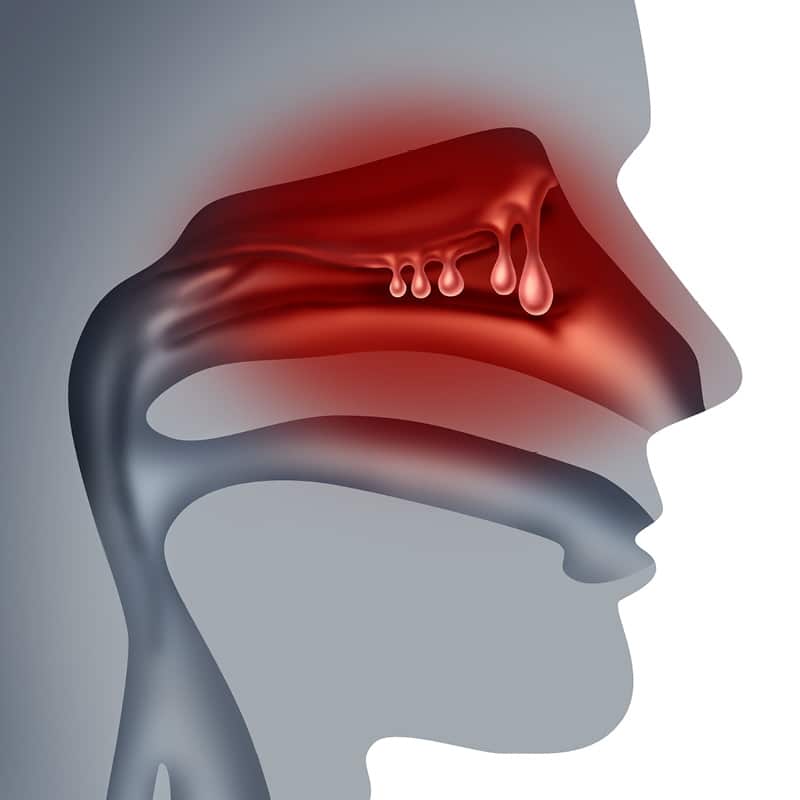Nasal Polyps
Nasal (or sinus) polyps are soft, painless growths that occur in the mucus lining of the nasal cavity as a result of chronic inflammation. Polyps have a pale, watery appearance and often look like a bunch of small grapes. Although it’s unclear why some people develop nasal polyps and others do not, people with asthma, recurrent sinus infections, allergies to environmental agents, aspirin intolerance, fungal sinusitis and certain immune disorders are more prone to developing nasal polyps.
There also seems to be a hereditary component to many chronic respiratory inflammatory disorders, including nasal polyps. While more prevalent after the age of 40, polyps can occur at any age, and are more common in men than in women. It’s possible to have a mild degree of polyps and be unaware of their presence.
Typical symptoms of nasal polyps include:
- Stuffy nose
- Post-nasal drainage
- Nasal obstruction
- Decrease in or complete loss of smell
- Decreased sense of taste
Most people with nasal polyps do not have any associated pain, but those who are susceptible to chronic infections often have facial pain and pressure. Most people do not seek the help of a sinus specialist until polyps progress and cause complete nasal obstruction.
Treatment Options
Most patients with nasal polyps and associated symptoms can be managed medically and, in certain cases, it’s possible to completely resolve the polyps using medicines alone. If polyps develop as a result of chronic sinus infections, treating the underlying infection with medications and improving the drainage pathways of the nasal cavity and sinuses will typically eliminate the polyps.
Oral Steroids
Oral steroids have been proven to reduce the size of most polyps. But while many patients can tolerate short courses of oral steroids without any side effects, others experience altered sleep patterns, weight gain or changes in behavior, which greatly limits medical treatment options. Long-term use of oral steroids should be avoided if possible, as prolonged treatment can affect bone density and result in changes to the fatty distribution of the body. Due to these side effects, systemic steroids in the form of injections or pills are only used intermittently.
Topical Steroids
Topical steroids in the form of nasal sprays are well tolerated by most patients, long term. Available over the counter, they can decrease nasal inflammation and help decrease the recurrence of nasal polyps. Unfortunately these sprays cannot access the site of origin of most polyps without first removing the polyps or opening the sinuses. These sprays can be used successfully, however, between courses of prescription steroids, with less severe side effects than oral steroids. Most patients with nasal polyps, whether they choose to have them removed or not, can expect to be on some type of nasal steroid spray for the remainder of their lives in order to control their symptoms.
Surgery
If medical therapy does not effectively control nasal polyps, surgery can often be a successful treatment option when combined with postoperative topical medications. Once the sinus cavities are opened through surgery, topical (sprays, nebulizers and rinses) steroids can reach the entire lining of the sinus cavities, thereby decreasing the need for oral steroids and keeping the polyps from recurring.
Steps After Diagnosis
If you are diagnosed with nasal polyps, you can first expect your ENT doctor to perform a nasal endoscopy and a nasal exam, followed by a CT scan. Endoscopy and CT scans are tools used to examine the entirety of the nasal and sinus cavities, and help the doctor identify exactly where the polyps are occurring and what other issues may be at play, such as a fungal infection, a deviated septum or other anatomical abnormalities.
While the majority of polyps are benign, if they are found on only one side of the nose, this increases the chance that they are malignant. A biopsy and CT scan may be needed to determine if the growth is malignant or premalignant. Most biopsies can be performed in the office and are relatively simple procedures with little or no pain for the patient.
Although polyps can cause a variety of issues, patients with this condition do not have to suffer. Symptoms can be easily managed and healthy sinus and nasal function can be restored under the care of an ENT physician.






